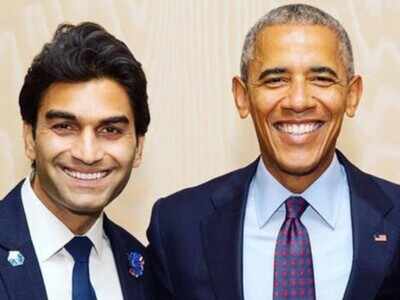Indian-American rookie shakes party establishment in Democrat primary; Suraj Patel could be first desi lawmaker from NYC

WASHINGTON: A young Indian-American attorney may be within striking distance of winning a Democrat primary in New York and heading to Congress in Washington DC, bringing to the fore not only the progressive insurgency that is shaking the party but also raising questions about establishment stranglehold and voter disenfranchisement even on the left-liberal side.
While political attention has largely been focused in recent days on the shock victory of Democratic Socialist Jamaal Bowman over 16-term Congressman Eliot Engel in New York’s 16th Congressional district, creeping up virtually unnoticed is the prospect of an even bigger upset in the Big Apple. Rank outsider Suraj Patel, 36, a former Obama White House staffer, trails party stalwart Carolyn Maloney, 74, who has been in the House since 1992, by a slender 648 votes in a Democratic primary in which huge numbers of mail-in ballots are yet to be counted.
Patel has filed a lawsuit pressing for counting all ballots, fearful that the party establishment could squash his bid to oust Maloney by manipulating the legality of mail-in votes. Unlike Bowman, whose 26-point lead over Engel at the end of regular counting immediately drew massive media attention, in part because he was backed by Alexandria Ocasio Cortez, Patel is politically “nobody’s child.” Although he worked for Obama, the party backed Congresswoman Maloney, a moneyed stalwart who also chairs the powerful House Oversight Committee.
Even the so-called “Samosa Caucus” of five Indian-American lawmakers did not back him, Patel said in an interview on Saturday, revealing that they threw their weight behind veteran Maloney. The media too largely ignored his campaign because he had no big name backing. Even the New York Times endorsed Maloney. So how has he come close to unseating her? By reaching out to a young demographic in the district that the party has long ignored, and persuading older voters that the status quo is a failure, says Patel.
According to Patel, more than 105,000 voted in the NY 16th congressional district primary, three times the normal turnout, in part because he says he galvanized young voters who have never voted in party primaries before. Although Maloney leads by just one point from around 40000 machine-counted votes so far (16,473 votes to 15,825), Patel believes the remaining 65,000 votes hold the key to his going to Washington because more than 50 per cent of the absentee ballots were requested by people under the age of 45. In fact, unofficial reports say Patel has taken a small lead after 3000 absentee ballots were counted.
“If all the mail-in ballots are counted, I will be the first Indian-American to go to Congress from New York, from east of Illinois” says Patel. The US House currently has four Indian-American lawmakers (Ami Bera and Ro Khannafrom California, Pramila Jayapal from Washington state, and Raja Krishnamoorthi from Illinois), and the Senate has one (Kamala Harris from California). The New York-NewJersey area, which has the highest concentration of PIOs, is yet to produce a lawmaker of Indian origin.
The November 2020 election could see a few more elsewhere in the country too: Sara Gideon, whose father is Indian, is tipped to oust Republican Senator Susan Collins in Maine, and Sri Preston Kulkarni, a former diplomat, is favored to flip in a GOP seat in Texas’ 22nd Congressional district that includes Houston.
Patel, who teaches business ethics at NYU, is a first generation Indian-American whose parents emigrated from India in the 1960s and started a hospitality business after his dad initially worked the night shift fixing subway track. “I grew up bussing tables, filling vending machines, doing motel laundry, and helping out on construction sites. Together as a family, we lived the American Dream, something that's nearly impossible in today’s rigged economy,” he says in a platform that is implicitly critical of even the Democratic establishment as it talks of “three decades of no progress and three decades of the same representation.”
Patel’s friends fear the party establishment may simple stall counting of mail-in ballots to save the seat of a stalwart and prevent another young insurgent from storming into Washington. “The longer this goes on, the harder it becomes to count all the votes,” Patel said, adding that the key to a full counting lies in the hands of Governor Andrew Cuomo, who can sign an executive order to that effect. “We only talk of voter suppression in Republican states, but unless every ballot is counted, we are open to the same charges,” he added.
Patel's first bid for the seat – which includes sections of Manhattan, Brooklyn, and Queens – came in 2018, when he lost to Maloney after polling 43 per cent votes. Since then, he believes he has made great inroads among the youth who are fatigued with politics as usual – even in the Democratic Party.
While political attention has largely been focused in recent days on the shock victory of Democratic Socialist Jamaal Bowman over 16-term Congressman Eliot Engel in New York’s 16th Congressional district, creeping up virtually unnoticed is the prospect of an even bigger upset in the Big Apple. Rank outsider Suraj Patel, 36, a former Obama White House staffer, trails party stalwart Carolyn Maloney, 74, who has been in the House since 1992, by a slender 648 votes in a Democratic primary in which huge numbers of mail-in ballots are yet to be counted.
Patel has filed a lawsuit pressing for counting all ballots, fearful that the party establishment could squash his bid to oust Maloney by manipulating the legality of mail-in votes. Unlike Bowman, whose 26-point lead over Engel at the end of regular counting immediately drew massive media attention, in part because he was backed by Alexandria Ocasio Cortez, Patel is politically “nobody’s child.” Although he worked for Obama, the party backed Congresswoman Maloney, a moneyed stalwart who also chairs the powerful House Oversight Committee.
Even the so-called “Samosa Caucus” of five Indian-American lawmakers did not back him, Patel said in an interview on Saturday, revealing that they threw their weight behind veteran Maloney. The media too largely ignored his campaign because he had no big name backing. Even the New York Times endorsed Maloney. So how has he come close to unseating her? By reaching out to a young demographic in the district that the party has long ignored, and persuading older voters that the status quo is a failure, says Patel.
According to Patel, more than 105,000 voted in the NY 16th congressional district primary, three times the normal turnout, in part because he says he galvanized young voters who have never voted in party primaries before. Although Maloney leads by just one point from around 40000 machine-counted votes so far (16,473 votes to 15,825), Patel believes the remaining 65,000 votes hold the key to his going to Washington because more than 50 per cent of the absentee ballots were requested by people under the age of 45. In fact, unofficial reports say Patel has taken a small lead after 3000 absentee ballots were counted.
“If all the mail-in ballots are counted, I will be the first Indian-American to go to Congress from New York, from east of Illinois” says Patel. The US House currently has four Indian-American lawmakers (Ami Bera and Ro Khannafrom California, Pramila Jayapal from Washington state, and Raja Krishnamoorthi from Illinois), and the Senate has one (Kamala Harris from California). The New York-NewJersey area, which has the highest concentration of PIOs, is yet to produce a lawmaker of Indian origin.
The November 2020 election could see a few more elsewhere in the country too: Sara Gideon, whose father is Indian, is tipped to oust Republican Senator Susan Collins in Maine, and Sri Preston Kulkarni, a former diplomat, is favored to flip in a GOP seat in Texas’ 22nd Congressional district that includes Houston.
Patel, who teaches business ethics at NYU, is a first generation Indian-American whose parents emigrated from India in the 1960s and started a hospitality business after his dad initially worked the night shift fixing subway track. “I grew up bussing tables, filling vending machines, doing motel laundry, and helping out on construction sites. Together as a family, we lived the American Dream, something that's nearly impossible in today’s rigged economy,” he says in a platform that is implicitly critical of even the Democratic establishment as it talks of “three decades of no progress and three decades of the same representation.”
Patel’s friends fear the party establishment may simple stall counting of mail-in ballots to save the seat of a stalwart and prevent another young insurgent from storming into Washington. “The longer this goes on, the harder it becomes to count all the votes,” Patel said, adding that the key to a full counting lies in the hands of Governor Andrew Cuomo, who can sign an executive order to that effect. “We only talk of voter suppression in Republican states, but unless every ballot is counted, we are open to the same charges,” he added.
Patel's first bid for the seat – which includes sections of Manhattan, Brooklyn, and Queens – came in 2018, when he lost to Maloney after polling 43 per cent votes. Since then, he believes he has made great inroads among the youth who are fatigued with politics as usual – even in the Democratic Party.
Download
The Times of India News App for Latest World News

Coronavirus outbreak
Trending Topics
LATEST VIDEOS
More from TOI
Navbharat Times
Featured Today in Travel
Get the app









